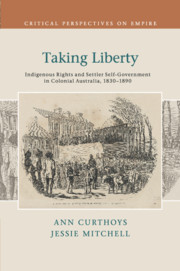Book contents
- Taking Liberty
- Critical Perspectives on Empire
- Taking Liberty
- Copyright page
- Contents
- Abbreviations
- Acknowledgements
- Maps
- Introduction
- Part I A Four-Cornered Contest: British Government, Settlers, Missionaries, and Indigenous Peoples
- Part II Towards Self-Government
- Part III Self-Governing Colonies and Indigenous People, 1856–c.1870
- Part IV Self-Government for Western Australia
- 15 ‘Little Short of Slavery’
- 16 ‘A Slur upon the Colony’
- Conclusion
- Index
16 - ‘A Slur upon the Colony’
Making Western Australia's Unusual Constitution, 1885–1890
from Part IV - Self-Government for Western Australia
Published online by Cambridge University Press: 28 September 2018
- Taking Liberty
- Critical Perspectives on Empire
- Taking Liberty
- Copyright page
- Contents
- Abbreviations
- Acknowledgements
- Maps
- Introduction
- Part I A Four-Cornered Contest: British Government, Settlers, Missionaries, and Indigenous Peoples
- Part II Towards Self-Government
- Part III Self-Governing Colonies and Indigenous People, 1856–c.1870
- Part IV Self-Government for Western Australia
- 15 ‘Little Short of Slavery’
- 16 ‘A Slur upon the Colony’
- Conclusion
- Index
Summary
- Type
- Chapter
- Information
- Taking LibertyIndigenous Rights and Settler Self-Government in Colonial Australia, 1830–1890, pp. 385 - 404Publisher: Cambridge University PressPrint publication year: 2018



